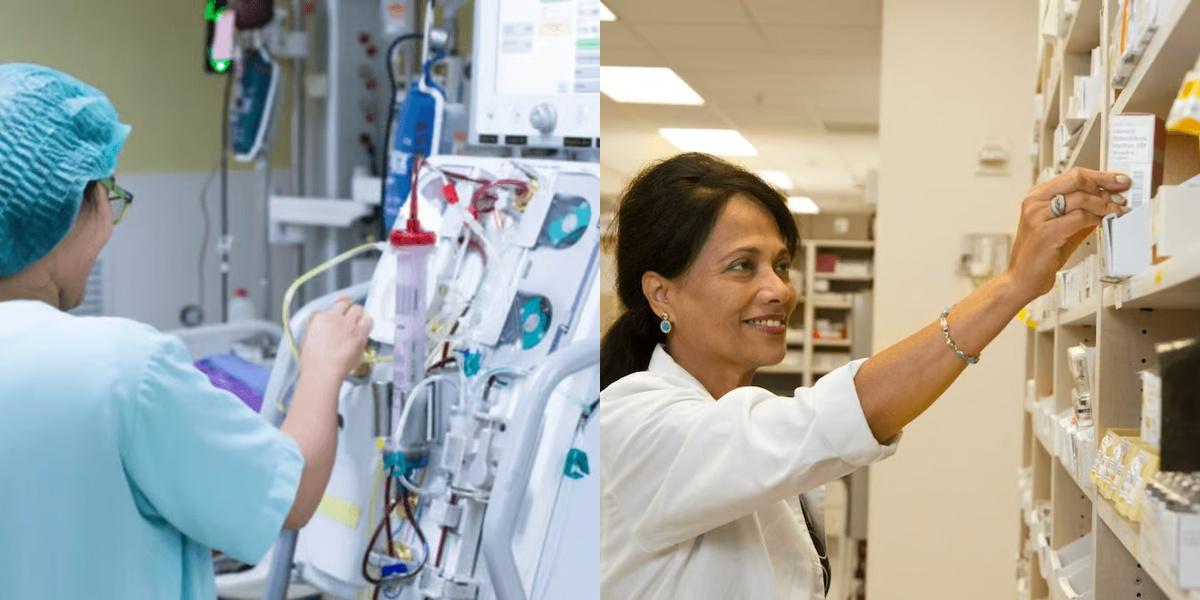Hemodialysis Technician vs Pharmacy Technician

Key Points:
- Hemodialysis Technicians operate dialysis machines and monitor patients' health, while Pharmacy Technicians assist pharmacists in preparing and dispensing medications.
- Hemodialysis Technicians generally earn a higher average salary than Pharmacy Technicians.
- Both jobs are in high demand, but the number of Pharmacy Technician positions may be slightly higher.
- Hemodialysis Technicians typically require in-person training, while Pharmacy Technicians can often complete their training online.
- The training for Hemodialysis Technicians is generally more expensive and longer than the training for Pharmacy Technicians.
Have you ever considered a career in the medical field but are unsure of which path to take? Two possible options to consider are becoming a hemodialysis technician or a pharmacy technician. While both roles involve working in a healthcare setting, there are significant differences between the two. In this blog post, we will explore the roles and responsibilities of a hemodialysis technician and a pharmacy technician, as well as the education and training required for each career. We will also compare the career outlook and salary potential for both professions. By the end of this article, you will have a better understanding of these two careers and be better equipped to decide which path is right for you.
Hemodialysis Technician vs Pharmacy Technician: Career Outlook and Salary
Hemodialysis Technician:
- The demand for hemodialysis technicians is expected to grow in the coming years due to the aging population and the increasing prevalence of chronic kidney disease.
- According to the Bureau of Labor Statistics (BLS), the employment of dialysis technicians is projected to grow 9 percent from 2020 to 2030, which is faster than the average for all occupations.
- The median annual wage for hemodialysis technicians was $40,350 in May 2020, according to the BLS.
- The top 10 percent of hemodialysis technicians earned more than $61,800 per year, while the bottom 10 percent earned less than $29,480 per year.
Pharmacy Technician:
- The demand for pharmacy technicians is also expected to grow, although at a slower pace compared to hemodialysis technicians.
- According to the BLS, the employment of pharmacy technicians is projected to grow 5 percent from 2020 to 2030, which is about the same as the average for all occupations.
- The median annual wage for pharmacy technicians was $34,020 in May 2020, according to the BLS.
- The top 10 percent of pharmacy technicians earned more than $51,640 per year, while the bottom 10 percent earned less than $24,980 per year.
Final Thoughts
Choosing a career in the healthcare field can be a rewarding decision, but it's important to consider your interests, skills, and career goals when deciding between becoming a hemodialysis technician or a pharmacy technician. While both professions offer opportunities to make a positive impact on patients' lives, they differ in terms of job responsibilities, work environment, and salary potential. By understanding the key differences between these two careers and evaluating your own strengths and preferences, you can make an informed decision that aligns with your professional aspirations.
Discover Dreambound's programs, conveniently offered in various locations. Find out more about these two vocations by visiting:

Marce Arnejo is part of the Sales team at Dreambound. Her role involves seeking out schools and institutions to provide valuable opportunities for students seeking a career in the healthcare sector. Beyond her professional life, Marce is passionate about music and gaming. She finds joy in exploring various genres of music and using gaming to unwind and immerse herself in virtual worlds. Her diverse interests enrich her personal life and contribute to her work by bringing new ideas and creativity.


